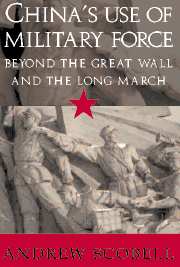Book contents
- Frontmatter
- Contents
- Preface
- China's Use of Military Force
- 1 Introduction
- Part I Layers of Culture
- Part II Use of Force in the Mao Era
- Part III Use of Force in the Deng Era
- 6 Half-Hearted Coercive Diplomacy: China's 1979 Attack on Vietnam
- 7 Why the People's Army Fired on the People: Beijing, 1989
- Part IV Use of Force in the Post-Deng Era
- Notes
- Bibliography
- Index
7 - Why the People's Army Fired on the People: Beijing, 1989
Published online by Cambridge University Press: 29 July 2009
- Frontmatter
- Contents
- Preface
- China's Use of Military Force
- 1 Introduction
- Part I Layers of Culture
- Part II Use of Force in the Mao Era
- Part III Use of Force in the Deng Era
- 6 Half-Hearted Coercive Diplomacy: China's 1979 Attack on Vietnam
- 7 Why the People's Army Fired on the People: Beijing, 1989
- Part IV Use of Force in the Post-Deng Era
- Notes
- Bibliography
- Index
Summary
THE flowering of the student protest movement in the People's Republic of China (PRC) in April 1989 and its bloody suppression by the People's Liberation Army (PLA) some two months later have been widely documented. The use of lethal force to crush a largely peaceful protest movement has been almost universally condemned. What is rarely discussed or understood, however, are the factors that led to the PLA opening fire with live ammunition on the citizenry of Beijing on June 3–4, 1989.
This chapter charts the rise of the protest movement and the response of CCP leaders. The decision to impose martial law and orders to the PLA to intervene are examined. Next the genesis of the orders to use deadly force and the military response are examined. Finally, the factors leading to this violent outcome are assessed.
Civil-Military Culture in Flux
In 1989, China's civil-military culture was in a state of transition, particularly civil-military format. Specifically, critical to understanding the outcome of the crisis are the role of a small but enormously influential group of elderly communists and the relationship between the military and the Chinese Communist Party (CCP).
First, although China's aging paramount leader Deng Xiaoping insisted that the reins of power had been successfully handed over to a new, younger generation of leaders, the events of 1989 proved this had not yet occurred.
- Type
- Chapter
- Information
- China's Use of Military ForceBeyond the Great Wall and the Long March, pp. 144 - 168Publisher: Cambridge University PressPrint publication year: 2003

